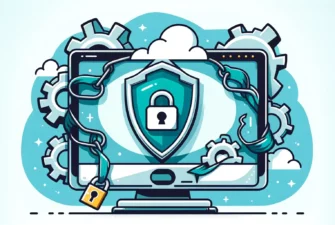
In the modern digital age, secure communication and data transfer are the lifeblood of the entire Internet. But how can users share their sensitive information online without worrying about potential breaches? Introducing Public Key Infrastructure (PKI) – a vital component for maintaining trust and security on the Web.
So, what is Public Key Infrastructure, how does it work, and why it’s essential in today’s digital landscape? We will also discuss PKI authentication, encryption, certificates, and how to obtain a PKI certificate. Finally, we will examine the potential consequences of ineffective implementation of PKI.
Table of Contents
- What Is Public Key Infrastructure (PKI)?
- What Are the Main Components of Public Key Infrastructure?
- How Does PKI Work?
- What Are the PKI Certificates?
- PKI and Email Encryption
- The Potential Consequences of Ineffective Implementation of PKI
What Is Public Key Infrastructure (PKI)?
PKI (Public Key Infrastructure) is a security framework that enables secure data transfer over the Internet. It is a system of hardware, software, policies, and procedures that work together to provide a safe and trusted environment for online communication. PKI ensures digital data authenticity, confidentiality, and integrity, protecting against cyber threats and fraud.
What Is PKI Used For?
PKI safeguards various platforms and applications, including e-commerce, online banking, e-government, email encryption, and secure remote access. It also protects online communications between organizations and individuals, VPN connections, electronic documents, and digital identities. Public Key Infrastructure maintains trust and security in the online world.
What Are the Main Components of Public Key Infrastructure?
To better understand the PKI components and their role in sustaining the whole PKI architecture, think of Public Key Infrastructure as a system of interconnected roads, railways, bridges, and tunnels but for electronic transactions. The PKI network helps build trust between people who send messages or money online, even though they can’t see each other in person.
So, how does it create trust in the faceless and paperless digital world? By providing message integrity and authenticating users via its four main components: technology, implementation, standards, and policy. Each part consists of multiple elements that work in tandem to ensure the unrestricted and unaltered flow of private data over the Internet.
Technology
Most PKI systems use several encryption algorithms, including Rivest–Shamir–Adleman (RSA), Digital Signature Algorithm (DSA), Digital Signature Algorithm, and Elliptic Curve Cryptography (ECC) to encrypt data in plain text into a string of undecipherable characters. Together with modern ciphers and sophisticated hashes, they are part of the Transport Layer Security (TLS) protocol – the standard cryptographic set of rules and technology for Web encryption.
Learn more about the difference between SSL and TLS.
Implementation
All Public Key Infrastructure policies and technology are implemented by trusted third-party entities known as Certificate Authorities (CAs). CAs issue SSL/TLS certificates to individuals and organizations to prove their identity and encrypt communications between browsers and web servers. Other players that fall into this category are Hardware Security Modules manufacturers, PKI application developers, SSL resellers, etc.
Standards
The entire PKI security relies on bulletproof standards suggested and developed by organizations like the Internet Engineering Task Force (IETF), Institute of Electrical and Electronic Engineers (IEEE), CA/Browser Forum, and other industry players like the Canadian Institute of Chartered Accountants/American Institute of CPAs (Certified Public Accountants) or the European Telecommunications Standards Institute (ETSI), that constantly improve the PKI infrastructure to meet the dynamic needs of our times.
Policy
Finally, government bodies and international regulators ensure that PKI standards apply to the legal framework of various jurisdictions. While their contribution to PKI development is marginal, they oversee the entire process and keep it within the law.
How Does PKI Work?
To better understand how PKI works at its core, we need to review what a cryptographic key and encryption are.
What is a cryptographic key?
In cryptography, a key is a bit of information that determines the output of an encryption or decryption algorithm. In encryption, a key transforms plaintext (readable message) into ciphertext (encoded message), which is unreadable without the key. Similarly, in decryption, the key transforms ciphertext back into plaintext.
What Is Encryption?
Encryption is the process that converts the message or data into an unreadable format, called ciphertext, using an algorithm or mathematical function. There are two main types of encryption: symmetric encryption and asymmetric encryption.
In symmetric encryption, the same key encrypts and decrypts data. As a result, the message sender and recipient need access to the same key. Symmetric encryption is fast and efficient, but it comes with a drawback – if the key is compromised, all the messages encrypted using that key become vulnerable.
In asymmetric encryption, also known as public-key encryption, there are two keys: a public key and a private key. The public key can be shared with anyone, while the private key, as the name implies, must remain confidential.
Discover the best private key management practices.
How PKI Binds Everything Together?
PKI works by using Public Key Cryptography (asymmetric encryption) to encrypt and decrypt digital data. In PKI, each user has a key pair consisting of a public and a private key. When a user wants to send encrypted data to another user, they use the recipient’s public key to encrypt the data. The recipient uses their private key to decrypt the data. This process ensures that only the intended recipient can read the information.
What Is PKI Authentication?
PKI authentication verifies user or device identity in a communication or transaction with the help of digital certificates issued by a trusted CA. In the context of SSL/TLS certificates, PKI authentication validates the identity of a website or server. SSL/TLS certificates secure online communications between browsers and web servers.
What Type of Encryption Does PKI Use?
PKI uses asymmetric encryption and multiple encryption algorithms, including RSA, DSA, and ECC. The most commonly used PKI encryption algorithm is RSA. Developed by Ron Rivest, Adi Shamir, and Leonard Adleman in 1977, it is named after their initials and uses two large prime numbers, “p,” and “q,” to generate a public key and a private key.
What Are the PKI Certificates?
PKI certificates are a critical component of the public key infrastructure system. Depending on what they secure, we can further classify them as x.509 PKI certificates, SSL/TLS certificates, code signing certificates, email certificates, and document signing certificates.
A PKI certificate contains a public key and other identifying information, such as the certificate holder’s name and the certificate authority (CA) that issued the certificate. The public key is used for encryption and digital signature verification, while the private key is kept secret and used for decryption and digital signature generation.
PKI certs are signed by trusted certificate authorities (CAs) responsible for verifying and validating a website’s or a company’s legal identity. CAs use several validation methods, including government-issued identification documents, LEI codes, or conducting in-person verification when necessary.
When users visit a website secured by a PKI certificate, their web browser checks the certificate’s legitimacy by looking at the issuer (CA), expiration date, revocation status, and whether it matches the domain name of the website they are visiting.
How to Get a PKI Certificate?
To obtain a PKI certificate, you must generate a Certificate Signing Request (CSR) and submit it to a Certificate Authority (CA). The CSR is a block of encoded text containing information about your identity and the public key you want to use. The CA verifies your credentials and issues a digital certificate with your public key.
You can generate the CSR before applying for a certificate either directly on your server or network or externally with the help of a CSR generator tool.
After the CA validates your request and delivers the certificate files via email, you can upload them to your server and secure communication with your website visitors or email contacts.
PKI and Email Encryption
Email encryption uses PKI to encrypt the content of an email message so that only the intended recipient can read it. To send an encrypted email, the sender must have the recipient’s digital certificate and public key. The sender uses the recipient’s public key to encrypt the message, and the recipient uses their private key to decrypt it.
Users must obtain an email or S/MIME certificate from a reliable PKI certificate authority. The certificate contains the user’s public key and other identifying details, such as their email address, identity, and the organization’s legal status. When a user sends an encrypted email, their client will automatically obtain the recipient’s digital certificate to encrypt the message.
PKI email encryption provides several benefits, including confidentiality, integrity, and non-repudiation. It ensures that only the intended recipient can read the email, and, thanks to the digital PKI signature, prevents the message from being altered during transmission, and provides a way to prove who the author of the message is.
Due to its popularity, simplicity, and convenience, email has always been prone to severe cyber-attacks, scams, and phishing. PKI email certificates eliminate data theft and fraud vulnerabilities and keep personal and corporate inboxes safe from prying eyes.
The Potential Consequences of Ineffective Implementation of PKI
Proper PKI implementation and key management are imperative for smooth and safe data transfer. The consequences of private and public key mismanagement could be dire. Here are five potential outcomes of ineffective PKI implementation:
- Data breaches: If PKI certification is loose and doesn’t adhere to the established standards and security practices, it can leave sensitive data vulnerable to attack. Cybercriminals can intercept and steal personal details, resulting in a data breach. This can lead to identity theft, financial loss, and damage to a company’s reputation.
- Loss of trust: PKI builds trust between parties, such as a website and visitors. If the PKI application is substandard, it can erode trust between them. Users may be hesitant to share personal information or conduct transactions on a website that does not have a robust PKI infrastructure.
- Legal liabilities: A compromised PKI CA or PKI server can also result in legal issues for a company. If sensitive data breaches occur due to ineffective PKI, the company may be liable for damages or face legal action.
- Operational inefficiencies: Ineffective PKI can also cause operational inefficiencies. For example, if digital certificates are not properly managed or maintained, it can lead to downtime or system failures. This can result in lost productivity and revenue for a company.
- Compliance issues: Many industries are required to comply with specific security standards, such as HIPAA (Health Insurance Portability and Accountability Act) or PCI DSS (The Payment Card Industry Data Security Standard). Inadequate use of PKI can result in non-compliance with these standards, leading to fines, legal liabilities, or loss of business.
Conclusion
In this article we’ve addressed some fundamental questions that encapsulate the entire SSL industry mainly, what is Public Key Infrastructure and what is a PKI certificate. As the digital landscape expands, PKI will become increasingly important in securing digital identities and data. It will continue to improve to meet the growing demand for secure and reliable digital communication and transactions.
In conclusion, PKI is a critical component of the digital ecosystem, providing the advanced security and trust required for the digital economy to thrive. Its role will keep evolving as digital connections become even more ubiquitous in our daily lives.
Save 10% on SSL Certificates when ordering today!
Fast issuance, strong encryption, 99.99% browser trust, dedicated support, and 25-day money-back guarantee. Coupon code: SAVE10



























